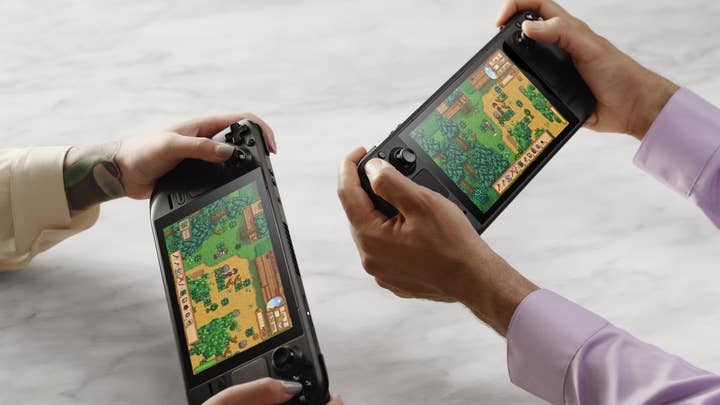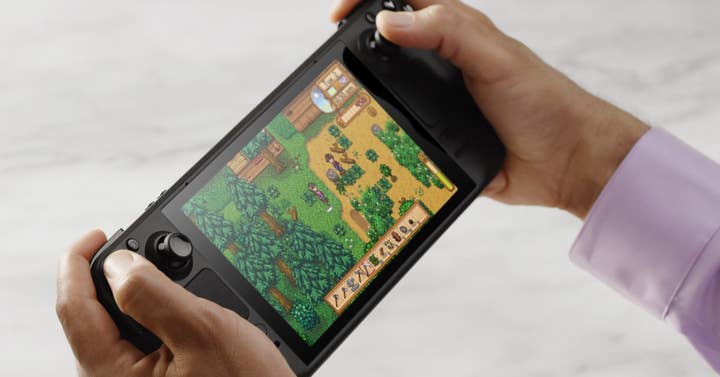Steam Deck could be a game changer for indies but it'll take a lot of work (from Valve, too)
Studios share their reactions and hopes around the new handheld gaming PC
In the minds of many, the prospect of a handheld gaming PC means the chance to take AAA games on the go -- the sort of blockbusters that aren't possible on mobile or available on Nintendo Switch.
But Valve's choice of Stardew Valley as the screenshot in some of Steam Deck's promotional imagery indicates another sector of the market that could benefit from the new handheld: indie games.
For better or worse, Steam remains the biggest and one of the most open marketplace for video games. There are little to no barriers for any indie studio looking to launch their game -- no platform holder to woo, no need for a publisher and very low costs involved in actually adding your game to the store.
That said, indie games are then tied to a desktop or laptop computer, which are typically played at a desk or table of some form. Granted, Steam's Big Picture Mode allows users to feed the image through their TV, but by and large PC gaming historically lacks the comfort and convenience of its console counterpart.
"I've never wanted a piece of gaming hardware to succeed more than this one"
Mike Rose, No More Robots
Small wonder, then, that PC typically makes up less than a quarter of the global market. But by bringing the world's biggest marketplace to a more accessible form factor, indies stand to benefit from the potential expansion of its userbase -- if the Steam Deck takes off, of course.
"I've never wanted a piece of gaming hardware to succeed more than this one," says Mike Rose, founder of indie publisher No More Robots. "If Steam Deck explodes and becomes a competitive device that millions of people buy -- and on my side it takes very little effort for us to get our games up and running -- and then we just see increased sales thanks to the new ease with which people can play our games? I don't like to throw the word 'game changer' around, but man, I would love for this to go off."
Prominent indie developer Rami Ismail's reaction is more reserved, but no less optimistic. "I think very little changes for indies, which is honestly a great outcome," he tells us. "More ways to play the same games, but on the go." He continues: "It's an interesting play into a market segment that's underserved. It's always interesting to me, but since it is an existing ecosystem, it doesn't open many opportunities for indies -- the games already doing well on Steam will do well on Steam Deck. From where I'm standing, it'll be interesting to find out whether that market segment is underserved -- or whether it just doesn't really exist."
Anna Jenelius, founder of Pendula Swing developer Valiant Game Studio, believes bringing indie games that have only been available on traditional PCs to a handheld unit will mean "more accessibility and mobility" for gamers. And it could potentially help studios like Valiant reach a different audience.
"[We] make games for a wide range of players who may not always consider themselves particularly hardcore, [so] it's exciting to see if this will mean that more players will find their way to Steam's catalog of games," she says.
Shahid Ahmad, indie developer and former director of strategic content at PlayStation, says his reaction was a mix of intrigue and relief. "I'm just glad it didn't come out in 2012, or I wouldn't have had a strategy for Vita," he says. "That said, it's almost a new format in its own right. There aren't many PC games around today optimised for such a small screen, but the upside here is that for the size of the screen, it offers enormous power, even though it's less than half an inch bigger than the largest iPhone, and it's not OLED.

"What it means for indies is more fragmentation, as that screen -- and initially the OS -- will require more work. However, many indie games start on PC, and it's going to be easier doing a Steam Deck port compared to say, a Switch port, the latter being the current indie console darling."
It's the prospect of reaching a Switch-like device without creating a new port that is perhaps of most interest to indies. As Ahmad says, most indie games begin life on PC but only reach a larger audience if they port to console -- particularly, as we've seen in the past few years, Nintendo's console/handheld hybrid. While it's unclear how many people it encompasses, there is undoubtedly a group out there that sees acclaimed indie games coming to Steam but hold out for a Switch release.
"I am hesitant to think Steam Deck will have a large enough impact to change much about 'Switch when?' [demands] for indie developers," says Ismail. "But if it works well, I do think the people that have a Steam Deck will be less likely to buy that game on Switch."
Jenelius adds: "Hopefully, the accessible nature of a handheld platform that needs no hardware upgrades or even a dedicated desk means that more players will try out Steam games. The success of the Switch shows that there is a wide range of people out there who are longing to play cool games, and hopefully many will be enticed by the already expansive Steam library.... With porting being such a large commitment for a small indie, however, being able to easily get on a handheld platform that fits the same space is an interesting opportunity."

Of course, this opportunity won't come easy -- and the onus lies on Valve for the time being as the new device rolls out and finds its audience. Simon Carless, founder of GameDiscoverCo, believes Steam Deck could be a "meaningful long-term win for indies" but warns that it always takes a long time for new hardware to build up an install base.

"As I write this, Steam itself has 20.5 million online concurrent users," he says. "It'll take a good while to even get to one million CCUs on Steam Deck -- you could need ten million devices sold to get there. It's a play for the long haul, but a smart one on Valve's part."
He adds that even if the Steam Deck takes off, the type of games purchased and played on it may differ drastically from those of Steam itself. The more successful genres on the marketplace are ones that "play less well on handheld devices," he says, pointing to city builders and deeper, more complex strategy games, which thrive on mouse and keyboard inputs.
"Over time, it's possible that the Steam Deck market will shift the genres that can do well on Steam," he concedes. "But with so many great titles from Steam's history available, you're not going to have the 'there's only a few games and an enthusiastic fan base' situation that helped early releases on Nintendo Switch sell so well. The sales wins of Steam Deck are going to be diluted over a whole bunch of (great) games."
Carless goes on to reiterate that, despite Valve's promise that Steam games will "just work" on the new device, developers will still need to adjust for UI and text size, plus any interface that's specific to keyboard and mouse. Titles that already support Big Picture Mode and console controllers will be in better stead here.
"The price is good. Nintendo will lose some indies to this. The AAA stuff won't need Steam Deck, but it allows games to be more pervasive"
Shahid Ahmad, indie developer
Ahmad agrees, adding: "Many games are already hard to read on smaller monitors, so going to a 7-inch screen at 1280x720 resolution is going to require some major considerations, the same considerations from a UI and overall view perspective as one would have to consider when doing a Switch port."
Jenelius says Valiant Game Studio has "not yet made any commitments" as to whether it will be reworking Pendula Swing for the Steam Deck, but is considering doing so. And the availability of the handheld is something the studio will keep in mind during future development projects.
As plenty of headlines and thinkpieces have reminded us all this week, the Steam Deck will be launching in the shadow of the Steam Machines, Valve's previous attempt at creating non-PC hardware to bring its marketplace into the living room or at least away from the typical desktop setup.
Indies seem to be confident that the Deck will perform better than this failed project -- "I mean, I bought this one," Ismail laughs -- but it still relies on a lot of effort from Valve in the long-run.
"My concern is that it'll launch, and it'll do fiiiine, because it's new hardware and the majority of gamers won't even know about it, let alone buy it," says Rose. "Plus the slightly higher price point won't help there. And then when the dust settles, Valve will most likely then see it did fine but not great and decide to ease off it, as we've seen them do with previous hardware. So I really hope they push through the launch, and keep hammering at it until it's more widespread.
"If it actually took off, this could be one of the most major things to happen to PC gaming in a very long time."

Ismail adds: "In terms of actual portable gaming, it's a small but growing market -- and Valve seems particularly positioned to take that on. The question is how many people feel like spending hundreds of dollars on a secondary gaming device -- the 'my Steam collection on the go' customer segment will obviously already have a PC for gaming."
Ahmad expects to see more support from Valve going forward, even suggesting it may add a section to the store highlighting games optimised for Steam Deck -- "And that's an opportunity for indies as they will be able to respond more quickly than the larger players," he says.
He continues: "The price is good. Nintendo will lose some indies to this. The AAA stuff won't need Steam Deck, but it allows games to be more pervasive. It should sell well, though it already looks a bit clunky and the screen is hardly cutting edge, so I suspect it will need a refresh soon. More than anything, having a credible player like Valve in this space might prove out the category for other entrants.
"Indie or not, a reliable, high-powered, portable Steam machine just offers people more opportunities to play. It doesn't have to be in shorter bursts, it can just be in more places, like on a couch next to a partner who is watching something on Netflix, or now that we're opening up a bit more, on the move."
Carless concludes that the most intriguing thing about Steam Deck is the fact it's such a long-term play on Valve's part.
"We don't know where it'll go in five or even ten years' time," he says. "We could get unexpected third-party hardware manufacturers, even smaller form factors, and all kinds of possibilities. It's the culmination of a lot of Valve work to allow games originally created on Windows to run smoothly on SteamOS, and it's being presented in a form factor that Windows is not naturally good at. So it makes a lot more sense than Steam Machines, given the maturity of the tech behind it.
"It's not a game changer until the hardware gets out there in full force -- and we shouldn't forget how much more expensive than Switch it is at the higher end -- but it's a positive move for indie and AAA game devs alike."

